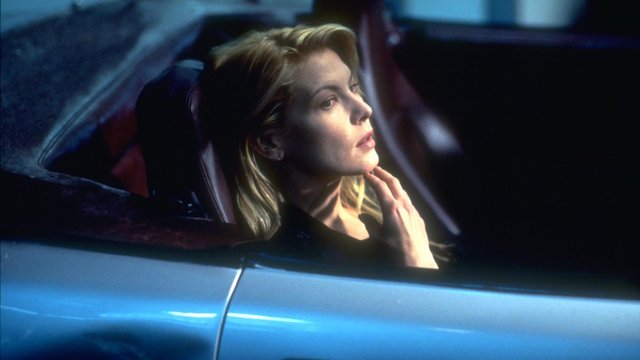Retro Film Review: Crash (1996)
There are few works of art that can shock you not once, but twice. The author of this review experienced this phenomenon with Crash, 1973 novel by James G. Ballard, British author best known for his science fiction novels. Initially, I expected some slick science-fiction thriller similar to Chricton's Coma and, to my great surprise, found the novel to be nothing more than cold, clinical and extremely graphic exploration of sexuality in modern-day world. Because of its style and content I instantly became convinced that Crash had snowball in hell chance of ever being adapted to screen. Few years later I received another shock after hearing that David Cronenberg would direct movie version. In 1996 it became obvious that the novel was apparently filmable after all. Yet, Crash was hardly a smashing success, despite special prize at Cannes Film Festival. The critics were split between those hailing it as a masterpiece and those calling it gratuitous pornography, while the audience was limited due to NC-17 rating.
The protagonist of the film shares the name of the novel's author. James Ballard (played by James Spader) is a movie producer who is married to beautiful and sexy Catherine (played by Deborah Kara Unger). Two of them live in an open marriage, often arousing each other by recounting adulterous encounters. One night Ballard is injured in a terrible car crash. Dr. Helen Remington (played by Holly Hunter), whose husband has been killed in the same crash, is also injured. Two of them begin to feel connected by the event and their liaison gradually becomes torrid affair. After a while Remington introduces Ballard to Vaughan (played by Elias Koteas), stunt driver and former scientist who created small cult that tries to merge automobiles with human sexuality. Ballard gradually enters this bizarre world and gradually gets to know Vaughan's obsession with a car crash as the ultimate form of sex act.
Cronenberg seemed like a perfect choice for the adaptation of this film. He had handled seemingly "unfilmable" material before, with his adaptation of Burroughs' Naked Lunch. His directorial style and choice of subjects - tales of depravity and carnage set in the ultra-modern but cold surrounding of urban Canada - also seemed well-suited for the subject matter. Cronenberg, who also wrote the screenplay, feels very comfortable here and the film has all of his trademarks. However, Cronenberg, even with all of his talent, was limited by the original text. The biggest problem of Crash is the lack of traditional plot. For most of the film we meet protagonists, but barely anything of importance happens. The only thing that happens is the series of sexual encounters, all portrayed with extreme naturalism, but lacking any truly erotic dimension. Another problem with the film is utter lack of feelings among the protagonists - they are all led by their lust and don't seem to have any life beyond it and it is quite difficult for the viewers to feel particularly attached to any of them, especially when they are all engaged in stupid and dangerous behaviour.
Thankfully, Crash compensates that with a good casting. Cronenberg had good ensemble of very talented actors and actresses, each one of them giving little touch of individuality to the characters that would otherwise be unrecognisable and utterly flat. James Spader is incredibly cold, phlegmatic and seemingly unresponsive to this new form of sexual stimulation, while Elias Koteas simply shines as its over-enthusiastic prophet. Holly Hunter is very effective as a woman who still haven't decided whether this new thing is for her or not, while Deborah Kara Unger oozes sensuality under the cover of icy Hitchockian blonde. Unfortunately, the acting alone can't prevent feeling of repetitiveness in certain scenes, and Howard Shore's often irritating musical score doesn't help either.
Yet, bellow that entire quasi-pornographic bore, lies a film that tries to comment on some trends in the modern world. There are few things that had so profound effect on 20th Century culture as the arrival of mass transport in the form of privately owned automobile. From the earliest days this new invention became inseparable from modern man's sexual life - first by providing young couples with a convenient location for their sexual activity, then by serving as a symbol of someone's wealth and power and thus providing him with sexual partners. These trends were quickly recognised by the advertising industry, modern media and car designers themselves - cars are today unmistakeably sexual symbols, sometimes even synonyms or surrogates for sexual prowess. Ballard and Cronenberg simply go a little bit further and speculate about automobiles becoming sex objects themselves and crashes becoming substitute for sex acts. This perversion might seem ridiculous, but it isn't as far from reality as we would like to believe. There is a historical anecdote about a man in 1930s Hungary who was arrested, tried and hanged for fatal railway sabotages. The only motive for his action was sexual arousal from the sight of derailing trains. So, technology might change, but its relation to the deviant nature of human being remains the same. Crash might not be a film for everyone, but it is good enough to remind us of those timeless and unpleasant truths.
RATING: 7/10 (+++)
(Note: The text in its original form was posted in Usenet newsgroup rec.arts.movies.reviews on October 14th 2002)
==
Blog in Croatian https://draxblog.com
Blog in English https://draxreview.wordpress.com/
Cent profile https://beta.cent.co/@drax
Minds profile https://www.minds.com/drax_rp_nc
Uptrennd profile https://www.uptrennd.com/user/MTYzNA
Brave browser: https://brave.com/dra011
BTC donations: 1EWxiMiP6iiG9rger3NuUSd6HByaxQWafG
ETH donations: 0xB305F144323b99e6f8b1d66f5D7DE78B498C32A7
Movie URL: https://www.themoviedb.org/movie/884-crash?language=en-US
Critic: AA
